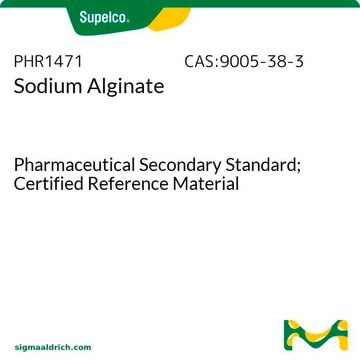Fontos dokumentumok
180947
Alginic acid sodium salt
powder
Szinonimák:
Algin, Sodium alginate
About This Item
Javasolt termékek
biológiai forrás
algae (marine)
Minőségi szint
form
powder
viszkozitás
15-25 cP, 1 % in H2O
InChI
1S/C6H10O7.Na/c7-1-2(8)4(5(10)11)13-6(12)3(1)9;/h1-4,6-9,12H,(H,10,11);/q;+1/p-1/t1-,2-,3-,4?,6+;/m0./s1
Nemzetközi kémiai azonosító kulcs
MSXHSNHNTORCAW-MPGIDXPLSA-M
Looking for similar products? Látogasson el ide Útmutató a termékösszehasonlításhoz
Általános leírás
Alkalmazás
- in combination with chitosan, to fabricate a biodegradable porous scaffold for bone tissue engineering.
- to study the characteristics of a modified amphiphilic alginate derivative
- to the study the impact of alginate on the rate of lipid digestion by employing an in vitro digestion model
- in the preparation of alginate hydrogels
- as encapsulating agents of microparticles of β-galactosidae
Tárolási osztály kódja
11 - Combustible Solids
WGK
WGK 1
Lobbanási pont (F)
Not applicable
Lobbanási pont (C)
Not applicable
Egyéni védőeszköz
Eyeshields, Gloves, type N95 (US)
Válasszon a legfrissebb verziók közül:
Analitikai tanúsítványok (COA)
Nem találja a megfelelő verziót?
Ha egy adott verzióra van szüksége, a tétel- vagy cikkszám alapján rákereshet egy adott tanúsítványra.
Már rendelkezik ezzel a termékkel?
Az Ön által nemrégiben megvásárolt termékekre vonatkozó dokumentumokat a Dokumentumtárban találja.
Cikkek
Chitosan is a naturally occurring polysaccharide ideally suited for use in medical supplies, devices, therapeutics, and diagnostics. The unique natural characteristics of chitosan include its cationic, biocompatible, biodegradable, non-toxic, non-immunogenic, and antimicrobial properties.
Collagen molecules play a critical role in tissue architecture and strength, and in cell-matrix interactions as insoluble ligands to regulate the diverse phenotypic activities of cells.
Hydrogel-based biomaterials for cell delivery and tissue regeneration applications are discussed.
Tudóscsoportunk valamennyi kutatási területen rendelkezik tapasztalattal, beleértve az élettudományt, az anyagtudományt, a kémiai szintézist, a kromatográfiát, az analitikát és még sok más területet.
Lépjen kapcsolatba a szaktanácsadással







